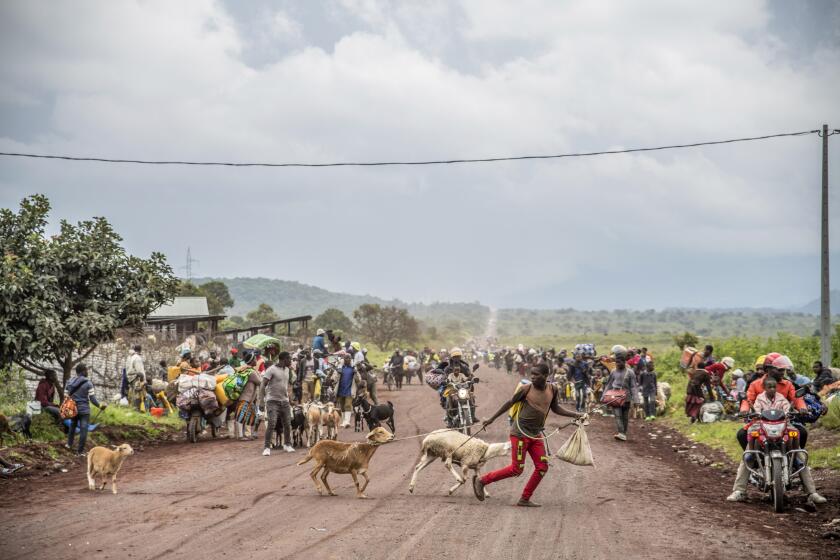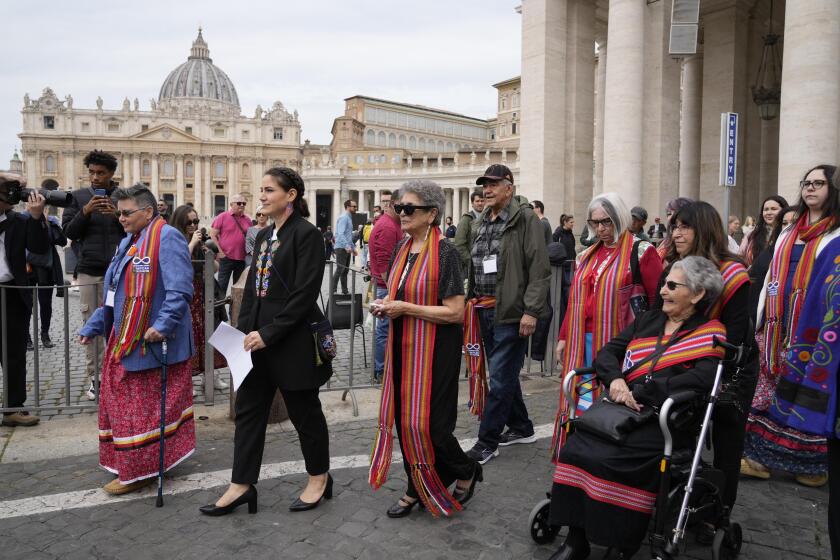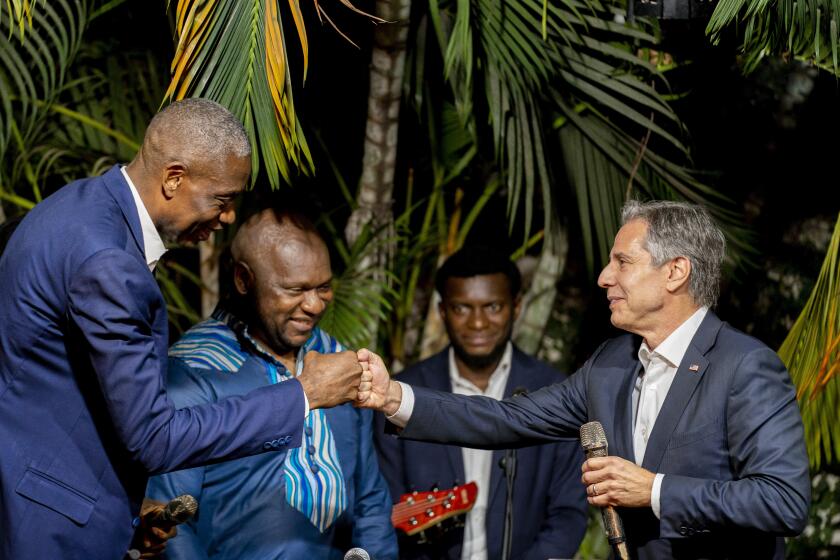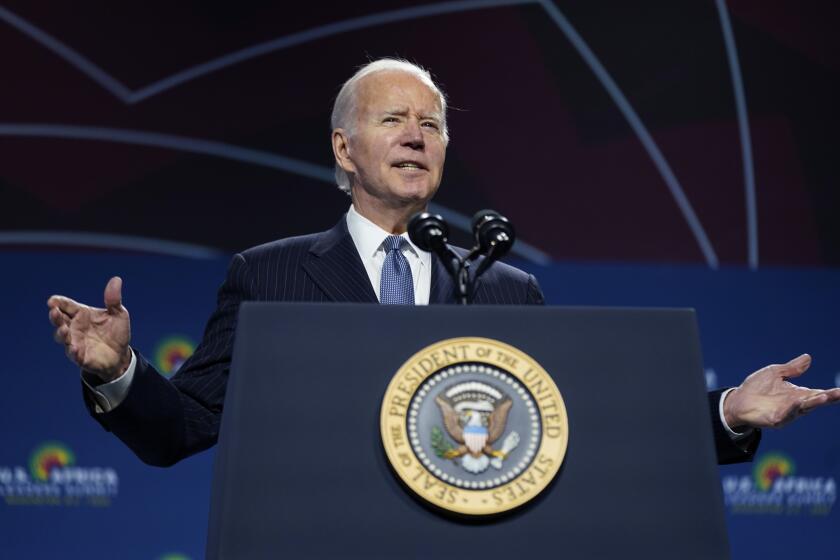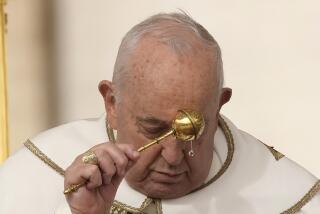‘Hands off Africa!’: Pope blasts foreign plundering of Congo
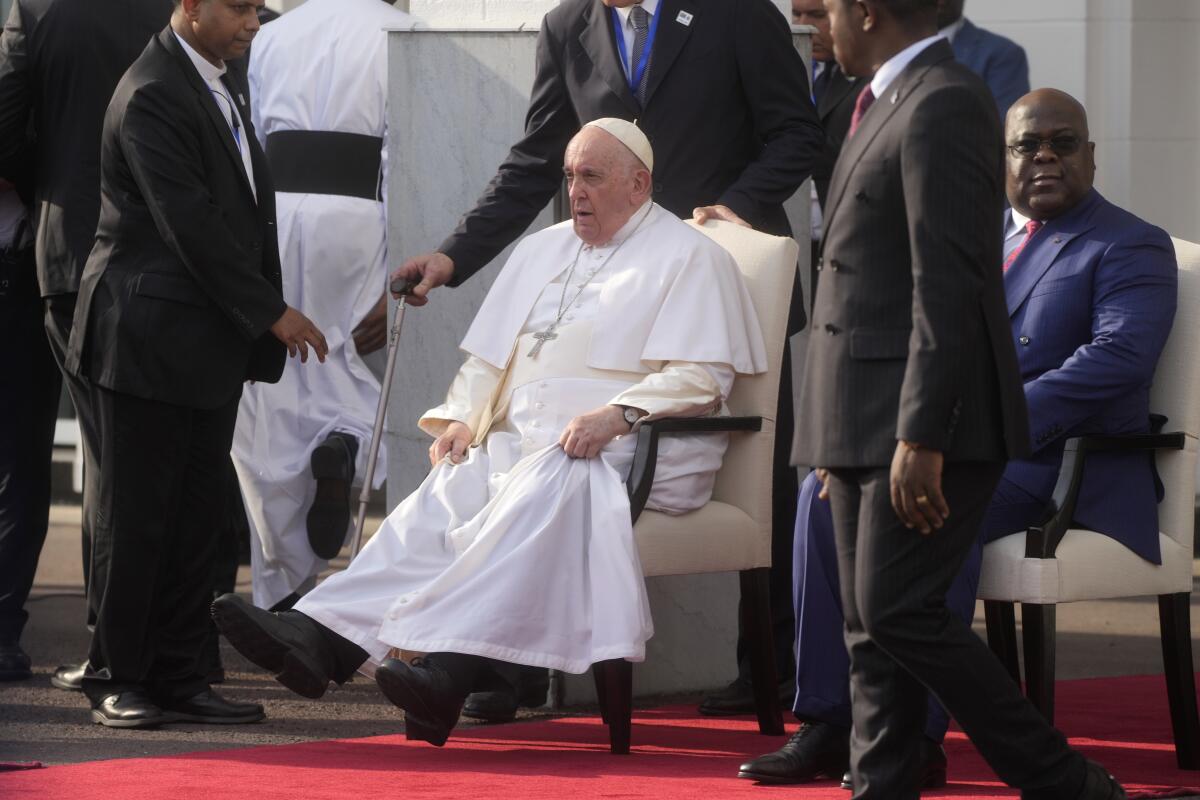
- Share via
KINSHASA, Congo — Pope Francis demanded Tuesday that foreign powers stop plundering Africa’s natural resources for the “poison of their own greed” as he arrived in Congo to a raucous welcome by Congolese grateful he was focusing the world’s attention on their forgotten plight.
Tens of thousands of people lined the main road into the capital, Kinshasa, to welcome Francis after he landed at the airport, some standing three or four deep, with children in school uniforms taking the front row.
“The pope is 86 years old but he came anyway. It is a sacrifice and the Congolese people will not forget it,” said Sultan Ntambwe, a bank agent in his 30s, as he waited for Francis’ arrival in a scene reminiscent of some of Francis’ earlier trips to similarly heavily Catholic countries.
Francis plunged headfirst into his agenda upon arrival, denouncing the centuries-long exploitation of Africa by colonial powers, today’s multinational extraction industries and the neighboring countries interfering in Congo’s affairs that has led to a surge in fighting in the east.
“Hands off the Democratic Republic of the Congo! Hands off Africa!” Francis said to applause in his opening speech to Congolese government authorities and the diplomatic corps in the garden of Kinshasa’s national palace.
Calling Congo’s vast mineral and natural wealth a “diamond of creation,” Francis demanded that foreign interests stop carving up the country for their own interests and acknowledge their role in the economic “enslavement” of the Congolese people.
“Stop choking Africa: It is not a mine to be stripped or a terrain to be plundered,” said history’s first Latin American pope, who has long railed at how wealthy countries have exploited the resources of poorer ones for their own profit.
Decades-old tensions between Rwanda and Congo rise have spiked along their shared border.
The six-day trip, which also includes a stop in South Sudan, was originally scheduled for July, but was postponed because of Francis’ knee problems, which were still so serious on Tuesday that he couldn’t stand to greet journalists in the plane heading to Kinshasa and forced him to use a wheelchair on the ground.
It was also supposed to have included a stop in Goma, in eastern Congo, but the surrounding North Kivu region has been plagued by intense fighting between government troops and the M23 rebel group, as well as attacks by militants linked to the Islamic State group.
The fighting has displaced some 5.7 million people, a fifth of them last year alone, according to the World Food Program.
Instead of traveling there, Francis will meet with a delegation of people from the east who will travel to Kinshasa for a private encounter at the Vatican embassy on Wednesday. The plan calls for them to participate in a ceremony jointly committing to forgive their assailants.
Sylvie Mvita, a student in economics in Kinshasa, said the pope’s arrival would focus the world’s attention and television cameras on Congo and the fighting in the east to show how its suffering has been forgotten by the rest of the world.
Pope Francis’ weeklong visit to Canada to apologize for church-run Indigenous residential schools marks a radical reconsideration of the Catholic Church’s legacy.
“This will allow the world to discover the atrocities of which our brothers in the east of the country are victims. And maybe for once, the little humanity that remains in some people will cause an awakening and the international community will not only be interested in what is happening in Ukraine but also in what is happening in this country,” she said.
President Felix Tshisekedi voiced a similar line in his speech to the pope, accusing the international community of forgetting about Congo and of its complicit “inaction and silence” about the atrocities occurring in the east.
“In addition to armed groups, foreign powers eager for the minerals in our subsoil commit cruel atrocities with the direct and cowardly support of our neighbor Rwanda, making security the first and greatest challenge for the government,” he said.
Rwanda has been accused of — and has repeatedly denied — backing the M23 rebels operating in Congo.
Secretary of State Antony J. Blinken urges free and fair Congo elections following the government’s arrest of a key opposition figure and its backsliding on climate action.
Francis’ tough words at the start set the tone for the trip, in which the pontiff is aiming to bring a message of peace, a warning to the international community to not look the other way and a recognition that Africa is the future of the Catholic Church.
The continent is one of the only places on Earth where the Catholic flock is growing, both in terms of practicing faithful and fresh vocations to the priesthood and religious life.
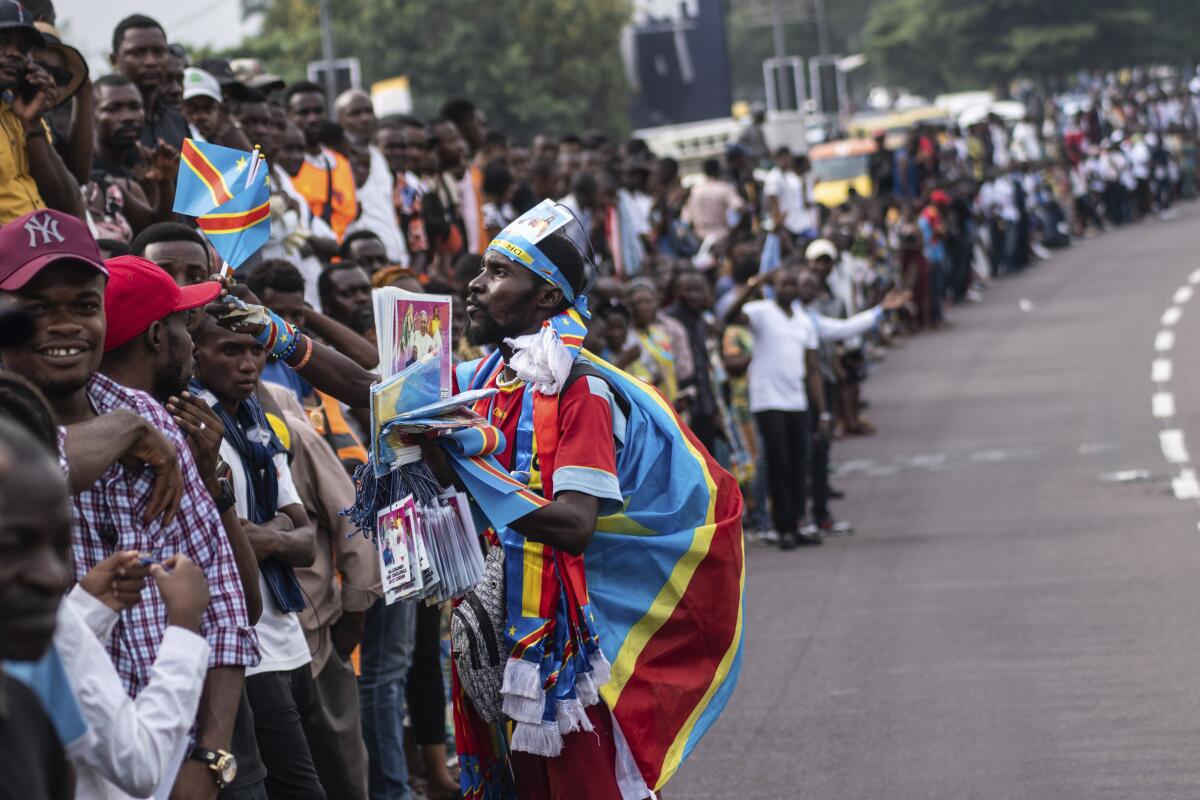
And Congo stands out as the African country with most Catholics hands down: Half of its 105 million people are Catholic, the country counts more than 6,000 priests, 10,000 nuns and more than 4,000 seminarians — 3.6% of the global total of young men studying for the priesthood.
That makes Francis’ trip, his fifth to the African continent in his 10-year pontificate, all the more important as the Jesuit pope seeks to reshape the church as a “field hospital for wounded souls,” where all are welcome, poor people have a special pride of place and rivals are urged to make peace.
Aid groups had hoped Francis’ six-day visit would shine a spotlight on the forgotten conflicts of Congo and South Sudan and their soaring humanitarian costs, and rekindle international attention amid donor fatigue that has set in due to new aid priorities in Ukraine.
Francis answered their call, pointing the finger at the role colonial powers such as Belgium played in the exploitation of Congo until the country, which is 80 times the size of Belgium, gained its independence in 1960, and neighboring countries are playing today.
President told dozens of African leaders gathered in Washington the United States is ‘all in on Africa’s future,’ as China’s influence on the continent grows.
Francis didn’t identify Belgium or any neighboring country by name, but he spared no word of condemnation, quoting Tshisekedi as saying there was a “forgotten genocide” underway.
“The poison of greed has smeared its diamonds with blood,” Francis said. “May the world acknowledge the catastrophic things that were done over the centuries to the detriment of the local peoples, and not forget this country and this continent.”
“We cannot grow accustomed to the bloodshed that has marked this country for decades, causing millions of deaths that remain mostly unknown elsewhere,” he said.
At the same time, he urged Congolese authorities to work for the common good and not tribal, ethnic or personal interests; and put an end to child labor and invest in education so that “the most precious diamonds” of Congo can shine brightly.
Congolese faithful were flocking to Kinshasa for Francis’ main event, a Mass on Wednesday at Ndolo airport that is expected to draw as many as 2 million people in one of the biggest gatherings of its kind in Congo and one of Francis’ biggest Masses ever.
Banners emblazoned with the pope’s image carried messages including “Pope Francis, the city of Kinshasa welcomes you with joy.”
Some women wore colorful dresses and skirts made of pagne, a wax print fabric featuring images of Francis, the Virgin Mary or the Vatican keys, in a celebratory sign of welcome.
Jean-Louis Mopina, 47, said he walked about 45 minutes to Kinshasa’s airport before the pope’s arrival on Tuesday.
“He has come like a pilgrim sent by God,” Mopina said. “His blessing will give us peace in our hearts.”
More to Read
Sign up for Essential California
The most important California stories and recommendations in your inbox every morning.
You may occasionally receive promotional content from the Los Angeles Times.
